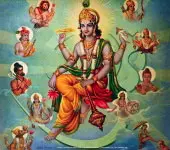नैनं छिन्दन्ति शस्त्राणि नैनं दहति पावकः |
न चैनं क्लेदयन्त्यापो न शोषयति मारुतः || 23 ||
nainaṁ chindanti śastrāṇi nainaṁ dahati pāvakaḥ |
na cainaṁ kledayantyāpo na śoṣayati mārutaḥ || 23 ||
Meaning:
Weapons cannot cut this soul, fire cannot burn it, water cannot wet it, and wind cannot dry it.
Context:
In this verse, Lord Krishna is explaining to Arjuna the nature of the soul (Atman) as being eternal, indestructible, and beyond the reach of any physical harm. The soul is not affected by any material elements such as weapons, fire, water, or wind. This teaching is given in the context of Arjuna's hesitation to fight in the battle of Kurukshetra, where he is overwhelmed by the thought of killing his relatives and teachers. Krishna is guiding Arjuna to understand that the body is temporary, but the soul is eternal and does not perish with the body. This understanding is crucial for Arjuna to rise above his emotions and perform his duty as a warrior.
Explanation:
The verse highlights the spiritual concept that the soul, or Atman, is beyond the physical realm. It cannot be harmed by any means known to man. This teaching is fundamental in Hindu philosophy, which asserts that while the physical body is subject to birth, growth, decay, and death, the soul remains untouched and immortal.
Lord Krishna uses this understanding to help Arjuna realize that his concerns about killing his kinsmen are misplaced, as the soul neither kills nor is killed. This eternal nature of the soul implies that the changes in the physical world do not affect the true self, which remains constant.
The verse also serves as a reminder of the impermanence of the physical world and the permanence of the spiritual realm. It encourages a focus on spiritual growth and the realization of one's true nature beyond the physical body.
Today's Context:
This verse teaches us that in life, we will face many situations where our physical, material, or emotional state might be challenged. However, by realizing the unchanging nature of our true self, we can navigate these challenges with resilience and clarity. Just like Ravi, who found strength in the understanding that his core self was intact despite external changes, we too can rise above life's adversities by anchoring ourselves in the eternal nature of our soul.
Meera and Rohan were a married couple who had been together for several years. They shared a deep bond, but recently, they had been facing significant domestic conflicts. The arguments would often escalate, leaving both of them feeling hurt and disconnected. One day, after a particularly heated argument, Meera felt completely overwhelmed. She started to question her worth and whether their relationship could survive the constant turmoil.
In her moment of despair, Meera recalled a verse from the Bhagavad Gita that her mother had once shared with her: 'Weapons cannot cut this soul, fire cannot burn it, water cannot wet it, and wind cannot dry it.' She began to reflect on its meaning. The verse reminded her that the soul—her true self—was beyond any harm that these conflicts could cause. The harsh words exchanged and the emotional turmoil were like the elements of fire, water, and wind—powerful in the moment but ultimately unable to touch the essence of who she was.
This realization brought Meera a sense of inner peace. She understood that while the arguments were painful, they did not diminish her true self. With this newfound clarity, Meera approached Rohan with a calm mind. She suggested they take a step back from the conflict and focus on understanding each other's perspectives without letting the situation define them.
Rohan, noticing the change in Meera’s demeanor, also began to reflect. He realized that their arguments had stemmed from temporary emotions and misunderstandings, but they did not touch the core of their relationship. Both of them started to work on their communication, remembering that their true selves and their love for each other were far deeper than the conflicts they faced.
Highlights from Traditional commentaries
Sri Abhinavagupta:
- The soul, like a person covered by clothes, remains unaffected even when the clothes are destroyed. Similarly, when the body is destroyed, the soul remains intact and merely takes on another body.
Sri Jayatritha:
- The soul's indestructibility is affirmed by stating that neither time nor any cause can destroy it. The verse emphasizes that just as the soul is unaffected by physical destruction, so too is it impervious to any external factors. An example is given: just as the head of Daksha was not destroyed by natural means but due to a special cause, the soul too cannot be destroyed by ordinary means.
Sri Madhusudan Saraswati:
- The soul, unlike the body, cannot be cut, burnt, wetted, or dried. The verse illustrates that while the body is subject to physical changes and destruction, the soul remains untouched. It highlights the soul's eternal and unchanging nature.
Sri Purushottamji:
- The verse emphasizes that the soul is beyond destruction by weapons, fire, water, or wind. The soul's indestructible nature means that even in the face of physical challenges, it remains unaffected. The explanation suggests that the actions like fighting in battle are to be performed for the satisfaction of the divine will, as the soul is invulnerable.
Sri Shankaracharya:
- The soul is beyond physical destruction due to its nature as indivisible and formless. Weapons cannot divide it, fire cannot burn it, water cannot wet it, and wind cannot dry it. The soul is thus eternal and immune to physical harm.
Sri Vallabhacharya:
- This commentary reinforces the indestructibility of the soul through a detailed explanation, comparing the soul to elements like earth, water, fire, and air, which cannot destroy it. The commentary emphasizes the soul's resilience and eternal nature.
Sri Anandgiri:
- The commentary highlights the soul's immutable nature, comparing it to space which is unaffected by physical elements. The soul's inability to be harmed by physical forces is emphasized, underlining its transcendental nature.
Sri Dhanpati:
- The commentary reiterates the soul's indestructibility by explaining that the soul, being indivisible, cannot be harmed by physical elements. The focus is on the soul's eternal and unchanging nature.
Sri Madhavacharya:
- The commentary emphasizes that the soul, being beyond physical harm, remains unaffected by any external cause. The example of Daksha’s head is used again to illustrate that the soul cannot be destroyed by ordinary means.
Sri Neelkanth:
- The commentary explains that the soul is beyond physical harm due to its subtle and indivisible nature. It is compared to space, which cannot be touched or affected by physical forces, highlighting the soul's invulnerability. The commentary further explains that the soul's indestructible nature is due to its non-physical attributes, making it immune to all physical changes. The soul is subtle, pervasive, and remains unaffected by any material forces.
Sri Ramanuja:
- The commentary elaborates on the soul's imperviousness to physical harm due to its subtle and pervasive nature. The soul, being finer than the elements like earth, water, fire, and air, remains untouched by them and is therefore eternal and unchanging.
Sri Sridhara Swami:
- The commentary clarifies that the verse is emphasizing the absence of means to destroy the soul. The soul cannot be harmed or altered by physical forces, reinforcing its eternal nature.
Sri Vedantadeshikacharya Venkatanatha:
- The commentary expands on the verse by explaining that the soul is not affected by physical elements due to its subtle and pervasive nature. The soul’s characteristics are such that it remains unaffected by any physical or material force, thus highlighting its eternal and unchanging nature.
Comments
Read more comments
Knowledge Bank
Ashwini Nakshatra meaning
Ashwini Nakshatra is named after its ruling deities Ashwini Kumaras. They are the sons of Surya and his wife Samjna in the form of a horse.
Which is the biggest enemy of bhakti?
Bhakti's biggest enemy is the desire for worldly pleasures. It would both prevent the dawning of bhakti, and slow down progress in the path of bhakti.
Recommended for you
Eclipse is not all that dangerous

The real devotee resonates with Sri Hari

Durga Pranati Panchaka Stotram

tvam' shalyaanaam' samupashamanee shailajaa shoolahaste vaatsalyaanaam' madhurajharanaa dehi bhadram' sharanyaa ......
Click here to know more..